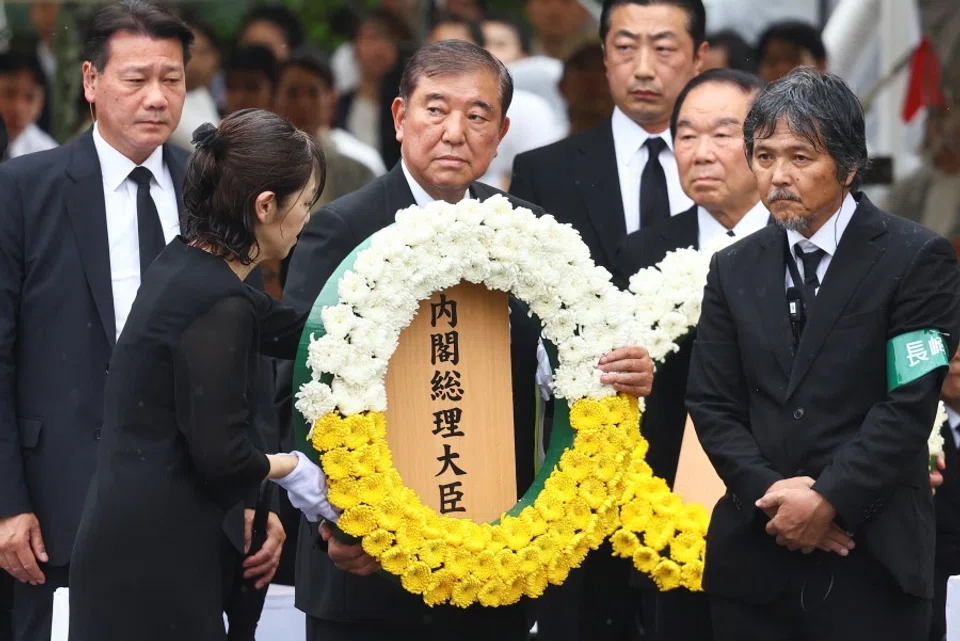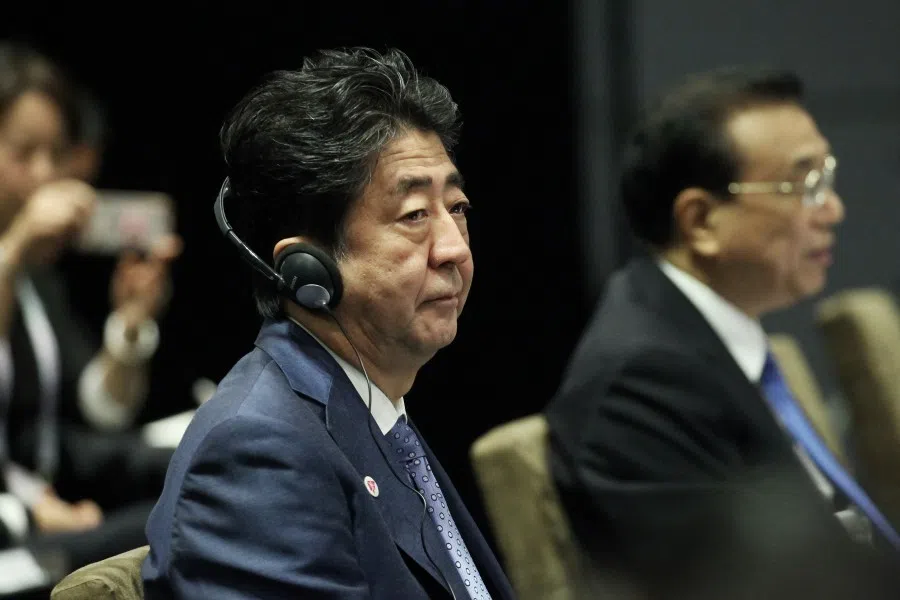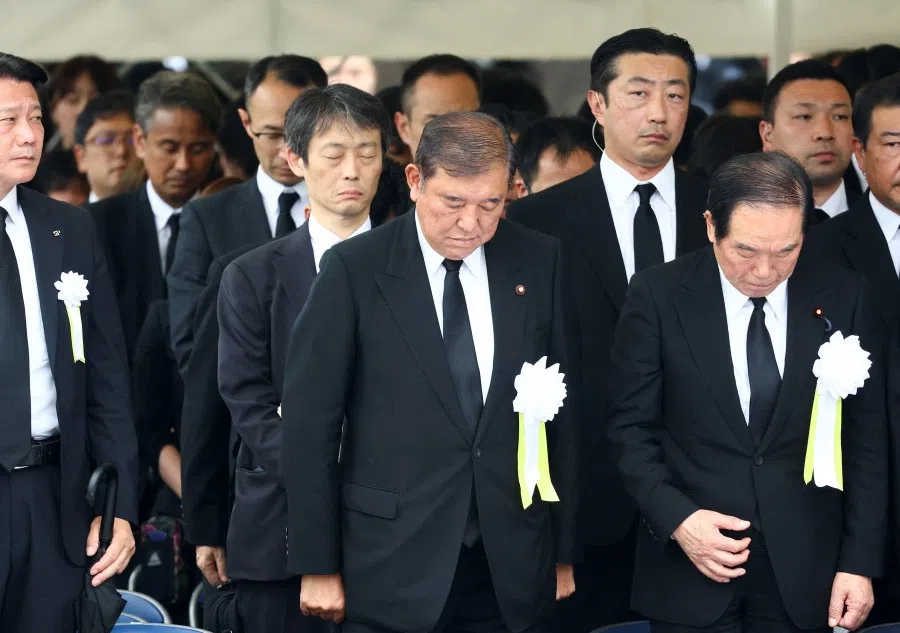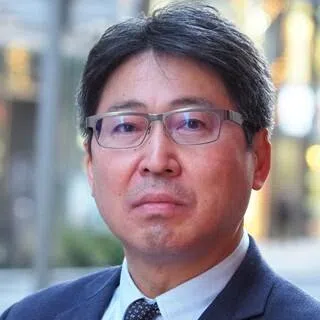80 years later, Japan still can’t agree on how to remember WWII
As this year marks the 80th anniversary of the end of World War II, all eyes are on whether Japanese Prime Minister Shigeru Ishiba will issue a statement, as his predecessors did. Japanese academic Shin Kawashima looks at the prospects.

This year marks the 80th anniversary of the end of World War II. Russia commemorated the occasion on 9 May, while China will do so on 3 September. Japan — on the losing side of the war — also plans to host various activities to mark the 80th anniversary of the postwar era. Among these, what has drawn the most attention is what kind of “statement” Prime Minister Shigeru Ishiba will make on the occasion of the 80th anniversary.
So far, there have been three such statements by Japanese prime ministers: the Murayama Statement in 1995 for the 50th anniversary, the Koizumi Statement in 2005 for the 60th anniversary, and the Abe Statement in 2015 for the 70th anniversary. All of them reflected an attitude of summing up the past and looking toward the future. These statements, however, have met with mixed reviews and sparked widespread debate.
These remarks show that at least as of 2007, a certain degree of mutual understanding had been reached between China and Japan on the question of historical perception.
History: A fading consensus
On 12 April 2007, then-Chinese Premier Wen Jiabao visited Japan and delivered a speech at the Japanese Diet, in which he gave high praise to the Murayama and Koizumi statements. Wen said: “Since the normalisation of diplomatic ties between China and Japan, the Japanese Government and leaders have on many occasions stated their position on the historical issue, admitted that Japan had committed aggression and expressed deep remorse and apology to the victimised countries. The Chinese Government and people appreciate the position they have taken. We sincerely hope that the Japanese side will act as it has stated and honour its commitment.”
These remarks show that at least as of 2007, a certain degree of mutual understanding had been reached between China and Japan on the question of historical perception. However, this mutual understanding was not carried forward in the years that followed.

Abe’s apology: final word?
In August 2015, Prime Minister Shinzo Abe’s statement, while inheriting the expressions of reflection and apology for Japan’s wartime aggression and colonial rule made in earlier statements, also referred to Japan in the pre–World War II period. He noted that around 1930, after World War I, Japan had deviated from the path of international cooperation and gone astray. However, the bulk of his statement emphasised Japan’s postwar path as a peace-loving nation and its contributions to the international community.
Within Japan, some viewed Abe’s statement as effectively bringing closure to the historical issues surrounding wartime recognition. However, it is Prime Minister Shigeru Ishiba who has raised doubts about that conclusion.
While the longevity of the Ishiba administration remains uncertain, he may consider issuing a statement to mark the 80th anniversary of the end of the war. At this stage, however, the issuance of a fourth statement — following those by previous prime ministers — appears difficult due to a lack of sufficient preparation.
As things stand, Ishiba may choose to deliver his own “views” in the form of an address, one without cabinet approval or binding effect.
In fact, such statements fall into two categories: “prime ministerial statements” formally approved by cabinet decision, which are generally inherited by subsequent governments; and “prime minister’s remarks”, which are not approved by cabinet decision and are not necessarily passed down to subsequent governments.
Ishiba: remembering victims of atomic bombing
Given the time constraints, preparing a full cabinet-approved statement is difficult. Nevertheless, Ishiba hopes to leave behind a few words. As things stand, Ishiba may choose to deliver his own “views” in the form of an address, one without cabinet approval or binding effect.
There has been wide speculation that such a speech could take place either on 15 August, the anniversary of Japan’s surrender, marking the end of the war (which in the end, no “official view” was issued on this day), or on 2 September, the day of Japan’s official surrender, which is seen as the more likely option.
For this reason, Ishiba’s remarks on 6 August in Hiroshima and 9 August in Nagasaki — the anniversaries of the atomic bombings — have drawn much attention. In fact, Ishiba has shown a different stance from previous prime ministers.
He has called for a world with “no nuclear war” and “no nuclear weapons” under the framework of the Nuclear Non-Proliferation Treaty (NPT), which forms the foundation of international nuclear disarmament and nonproliferation, and has sounded the alarm about the danger of nuclear war.
The heavy bone must be a teacher’s
The small skulls beside it must be students gathered around...

He also twice recited a tanka by poet Shoda Shinoe, a survivor of the atomic bombing:
The heavy bone must be a teacher’s
The small skulls beside it must be students gathered around...
This poem portrays the scene of many children’s small remains gathered beside the teacher’s larger bones, evoking the image of children instinctively clustering around their teacher at the moment of the atomic explosion. This, too, demonstrates Ishiba’s heartfelt concern for the victims of the atomic bombings.
In other words?
On the other hand, some observers have noted that Ishiba’s recent address closely mirrors an article published by a commentator in August 2025. This has led to speculation that Ishiba is shaping his own “views” for the 80th postwar anniversary around the ideas put forth by this commentator.
Ishiba has emphasised the importance of “verifying history” and has argued that the term “end of the war”, as used in Abe’s statement, should instead be described as “defeat”. At the same time, it has been revealed that the statement he is preparing will also incorporate elements from the declarations of previous prime ministers.
... it remains uncertain how long the Ishiba administration will last and whether it will actually deliver such “views”.
There are many differing opinions regarding Ishiba’s forthcoming “views”. In particular, opposition from conservative politicians who support Abe’s statement has been especially strong. However, former Democratic Party Prime Minister Yoshihiko Noda and others support issuing “views” on the 80th postwar anniversary. For Noda, this also seems to be a calculated move, as he expects Ishiba’s proposed “views” to stir debate within the Liberal Democratic Party.
As mentioned earlier, it remains uncertain how long the Ishiba administration will last and whether it will actually deliver such “views”. Even so, one of the major topics surrounding Japan’s 80th postwar anniversary is undoubtedly the debate over these “views”.





![[Big read] When the Arctic opens, what happens to Singapore?](https://cassette.sphdigital.com.sg/image/thinkchina/da65edebca34645c711c55e83e9877109b3c53847ebb1305573974651df1d13a)